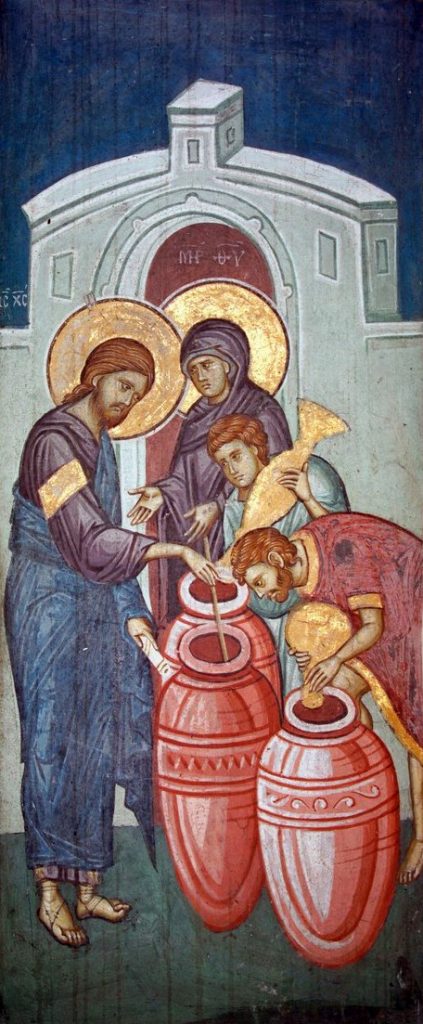Dear Brothers and Sisters,

Have you noticed how Jesus makes a party even better? John 2:1-10 tells of the time Jesus saved a wedding party from embarrassment by turning water into the highest quality wine. I’d love to have a taste, agreeing with Martin Luther that “beer is made by men,” but “wine by God.”
Though Scripture doesn’t say which grape Jesus had in mind when turning water into wine at the wedding in Cana of Galilee, perhaps it was the one that comes from the Vitis vinifera vine, which is the source of most of the grapes used to make wine in our day. That vine produces grapes that have thicker skins, larger seeds and typically are sweeter than the table grapes we’re familiar with.

I find it interesting that Jesus’ first public miracle (John 2:11a) was essentially private—accomplished without the knowledge of its main beneficiaries, the wedding party. Nevertheless it was of great importance in that it provided evidence to Jesus’ disciples (John 2:11b) that Jesus truly was the incarnate Son of God sent to save the world. Perhaps that’s why one theologian quipped that “wine is like the incarnation—both divine and human.”

(via Wikimedia Commons)
Though Jesus’ miracle saved the wedding party in Cana from a major social faux pas, it did not address human suffering in the way his many healings and exorcisms did. Nevertheless, turning water into wine strikes me as a good first miracle for Jesus, not because wine is the most healthful and hygienic of beverages (as claimed by Louis Pasteur), but because by turning water into wine, Jesus demonstrated his power over nature. He didn’t just change the water’s flavor, he changed its molecular structure! By doing so he showed both the power and goodness of God.
That the setting for Jesus’ first public miracle was a wedding seems to me to carry great meaning. Perhaps that’s because I’m thinking a lot about my daughter’s upcoming wedding, but most of all it’s because Scripture tells us that those who receive Jesus in faith (the church as one body) enjoy an intimate, eternal relationship with Jesus as his “bride” (Eph. 5:25-27; Rev. 19:7-9). In Scripture, wedding celebrations often serve as metaphors of the messianic age and the fullness of the kingdom. Jesus desires that we not only anticipate that fullness, but that we pursue it. He makes this point in several of his kingdom parables, including this one:
The kingdom of heaven is like a merchant looking for fine pearls. When he found one of great value, he went away and sold everything he had and bought it. (Matt. 13:45-46)
In this parable Jesus shows that the kingdom (and particularly the king of the kingdom) is the most valuable thing we’ll ever possess. The International Standard Bible Encyclopedia states that parables are “almost always formulated to reveal and illustrate the kingdom of God” (vol. 3, p. 656). In Parables of the Kingdom, C.H. Dodd adds that a parable is “a metaphor or simile drawn from nature or common life, arresting the hearer by its vividness or strangeness, and leaving the mind in sufficient doubt about its precise application to tease it into active thought” (p. 16). Though not parables per se, many of Jesus’ miracles were kingdom-focused. In turning water into wine, he made a point similar to the one he was making in some of his kingdom parables, likening entrance into the kingdom to attending a great banquet.
In John 2:11 we’re told that the miracle of turning water into wine was a “sign” by which Jesus “revealed his glory.” But in what way? In healing people, Jesus revealed his authority to forgive sin. In cursing the fig tree, he showed that judgment was coming upon the temple. In healing on the Sabbath, Jesus revealed his authority over the Sabbath. In raising people from the dead, he revealed that he is the resurrection and the life. By feeding thousands, he revealed that he is the bread of life. And by miraculously providing abundant blessings for a wedding banquet in Cana, Jesus seems to have been revealing that he is the one who provides the abundant kingdom blessings of God that contribute to joy and life, both now and in the fullness of the kingdom. The miracle at Cana thus fills out for us a little more of Jesus’ true purpose and character. When I contemplate that miracle, I can’t help but consider how Jesus is transforming us into something far more glorious than what we would be apart from his miraculous work in our lives.
Jesus’ miracle at Cana often comes to mind when I’m enjoying a glass of fine wine. By saying that, I’m not advocating the abuse of alcohol in any way. As Paul would say, “God forbid!” The Bible frequently warns against such abuse (Gal. 5:21) and Jesus forbids drunkenness (Luke 21:34). That being said, reading of Jesus’ miracle at Cana helps me live and work in a way that points toward the coming fullness of the kingdom of God when Jesus will have removed all the residue of sin and we will sit down with him at the greatest family reunion banquet of all time. Perhaps Jesus will provide some of that wine from Cana! It will surely “gladden” our hearts (Ps. 104:14-15).
Raising my glass in a toast to the kingdom,
Joseph Tkach



I have been thinking of this “sign” as well–all the water in the jars was for physical cleaning, but His wine, which was the best, pictures his blood cleansing us from sin (which John saw later on when he was writing, thus he called it a “sign” of the Messiah, and his disciples believed in him).